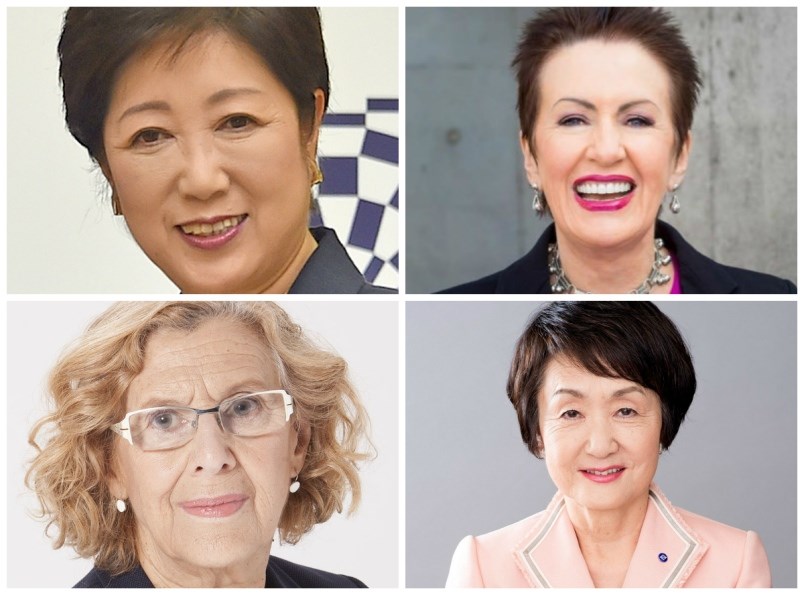Late last month, a Courier feature story examined why Vancouver has never elected a female mayor. Theories were put forth by Vision Vancouver Coun. Andrea Reimer, Green Party Coun. Adriane Carr and former COPE Coun. Ellen Woodsworth.
Whether it happens in the upcoming civic election in October remains to be seen, but the fact a disproportionate number of cities across the globe elect male rather than female political leaders has captured the attention of the City Mayors Foundation, a philanthropic organization established in 2003 dedicated to urban affairs.
Every two years, it stages the World Mayor Project, handing out the World Mayor Prize to recognize a mayor who has made “outstanding contributions to his/her community and has developed a vision for urban living and working that is relevant to towns and cities across the world.”
Calgary’s Naheed Nenshi captured the honour in 2014. Former Vancouver mayor Larry Campbell was longlisted in 2005, while Mayor Gregor Robertson was longlisted in 2016.
This year, however, Vancouver won’t be in the running at all, although many other Canadian cities, including Maple Ridge, Victoria, Ladner, Squamish and Montreal, could be. The foundation is only accepting nominations for female mayors for the 2018 title.
That’s because the 2018 World Mayor Project is dedicated to women in local government in recognition of the fact that in local government, particularly in politics, women are under-represented and undervalued. Only about 20 per cent of the world’s mayors are female, according to the foundation’s research, while only between 30 and 35 per cent of city councillors are female.
Tann vom Hove, Senior Fellow at the City Mayors Foundation based in London, England, told the Courier in previous World Mayor Projects about 30 per cent of the nominees were female.
That said, women have won the World Mayor Award in the past.
Athens, Greece’s Dora Bakoyannis earned it in 2005 and Cape Town’s Helen Zille captured it in 2008. Canadian female politicians have also made strong showings — former Mississauga Mayor Hazel McCallion was awarded second place in 2005, while Surrey’s Dianne Watts was awarded fourth place in 2010.
“But by dedicating the 2018 Project entirely to women in local government, we hope to be able to feature more female city leaders, at greater depth,” the foundation states. “We wish to show what outstanding women mayors achieve all over the world. By doing so, we hope to encourage more women to contemplate a career in local government and run for political office.”
The foundation will publish the first “open” longlist for the award next month. Open means more nominees can be added to the longlist. The “closed” shortlist will be published in July. The winner of the World Mayor Prize and other results will be announced in early 2019. The winner will receive the World Mayor award, while two runners-up will receive commendations.
Vom Hove said the awards are publicly conducted, based on nominations and testimonials submitted by the global community. The final selections will be made by the fellows of the City Mayors Foundation. Mayors wishing to be considered for the World Mayor Prize also have to agree to the code of ethics for local government.
“By having all-women long- and shortlists we will be able to feature many more women mayors and their achievements,” vom Hove told the Courier.
He also noted that: “In order to allow mayors from smaller communities to compete on equal terms with those of large cities, all nominations as well as second-stage votes will have to be accompanied by supporting statements. At the end, the persuasiveness of testimonials counts for more than the number of votes. One of the aims of the [World Mayor Project] is to increase awareness of and interest in local government as well as to allow participants to compare the challenges faced by mayors from different parts of the world.”
For the World Mayor Project 2018, the foundation is seeking nominations of female mayors “from towns and cities of all sizes who serve with integrity, determination and imagination” who have qualities such as:
- competence in managing the day-to-day affairs of their cities
- acumen of financial, business and economic affairs
- honesty and integrity in decision-making
- repugnance for using the office of mayor for self-enrichment
- fairness in dealing with the varied needs and concerns of citizens
- ability and ambition to be a mayor for all citizens, irrespective of their cultural, racial or social backgrounds and foster tolerance and amity among different communities
- belief in working together with other cities, nationally and internationally
- vision for a city that provides future generations of citizens with prosperity, safety and happiness
- conviction that protecting and enhancing the environment is not optional but an absolute must
- caring for disadvantaged groups of citizens.
noconnor@vancourier.com
@naoibh



